According to an American psychology professor, being perpetually guided by goals would not really be a positive thing. Indeed, we are constantly exposing ourselves to disappointments and this would unfortunately affect our ability to be happy.
Many people have a rhythm of life that leaves very little room for rest, and especially for relaxation. This kind of rhythm quite often pushes individuals to set new goals to achieve to always be effective. On the other hand, constantly following to-do lists or always trying new projects can also be a kind of escape from certain problems or a state of depression. As explained in an article published by The Guardian on July 8, 2021, a paradox exists:each accomplishment is synonymous with the disappearance of the objective, the very one giving meaning to existence. Can then occur an identity crisis when it comes to looking for a new quest and moving on.
This kind of phenomenon has a physical explanation . Indeed, by anticipating the achievement of a goal, we release dopamine – the pleasure hormone – which gives the motivation to adopt the behavior necessary for our survival. An example is a study from the University of Cambridge (UK) which in 2009 proved that gamblers experience a greater dopamine surge when they lose than when they win. In other words, winning is a kind of disappointment after the thrill of the event that bettors bet on.
Can this inevitable disappointment be avoided? Kieran Setiya is Professor of Psychology at MIT (USA) and author of Midlife:A Philosophical Guide . He was inspired by the famous Greek philosopher Aristotle to develop his idea:we need "telic" activities - from the Greek word telos (goal). However, these activities are quite simply those we do entirely for pleasure . Above all, the latter have no purpose and are generally assessed in the present and concern the well-being of individuals.

So gardening, going to the beach, walking in the mountains, singing, playing sports or even learning a language in a fun way are all activities that may be suitable. However, let us mention an important condition:it should not be made an end in itself. According to Kieran Setiya, the ideal behavior would be to encourage this type of activity more and consider them as complements to our main activities , our missions, our objectives.